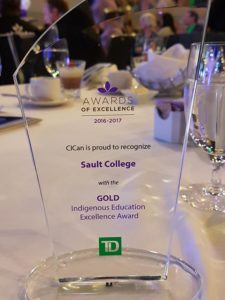Sault College receives prestigious national award
 SAULT STE. MARIE, ON (May 1, 2017)–Sault College has received national recognition for its ongoing, strong commitment to Indigenous education. Today, representatives from Sault College proudly accepted the Colleges and Institutes Canada’s (CiCan) Indigenous Education Excellence Award as the Gold recipient!
SAULT STE. MARIE, ON (May 1, 2017)–Sault College has received national recognition for its ongoing, strong commitment to Indigenous education. Today, representatives from Sault College proudly accepted the Colleges and Institutes Canada’s (CiCan) Indigenous Education Excellence Award as the Gold recipient!
CiCan’s Indigenous Education Excellence Award recognizes a college or institute that has demonstrated commitment to Indigenous education through innovative approaches and dedicated structures, curriculum, holistic support services and community partnerships that contribute to learner success, as well as socio-economic development and reconciliation within communities[1].
With more than 30 years of experience, Sault College continues to be passionate about and dedicated to the advancement of Indigenous education in Ontario. Offering a post-secondary environment that is inviting and open, Sault College supports its Indigenous learners’ post-secondary aspirations and fosters an understanding and appreciation of the histories, culture and traditions of Indigenous peoples.
“I am tremendously proud to announce that Sault College is the Gold recipient of CiCan’s Indigenous Education Excellence Award,” says Dr. Ron Common, President Sault College. “Our commitment to Indigenous learning is embedded in so many aspects of our College, including our strategic plan (2016-2020). The commitment of our staff in our School of Indigenous Studies is nothing short of amazing. They have and continue to foster and reinforce a culture of inclusion, acceptance and understanding, and have positioned our College as leaders in Indigenous education. I would also like acknowledge the commitment to Indigenous education and extend congratulations to the Silver and Bronze recipients, Cambrian College and Lethbridge College respectively,” he adds.
Sault College was presented this prestigious national award for its continued work in many important areas, including: its ongoing respect of intellectual and cultural traditions, its willingness to create an environment of social inclusion, its dedication to creating safe and inspiring spaces that effectively address barriers to education, and its commitment to fostering engaging collaborations between our institution and Indigenous partners.
While Sault College has embarked on many initiatives in support of the Indigenous community, some notable highlights include:
- Creation of Indigenous-specific academic programming
- Hiring of Elders-in-Residence (campus support)
- Native Education and Training Council (NETC) in place for the past 25 years – NETC is an Indigenous community-based council provincially mandated to direct and monitor the work of Sault College with respect to Indigenous specific academic, training and support programs.
- Dedicated Indigenous staff and faculty, including Indigenous-specific counsellors
- Construction of ‘Wiigwaasgamig’ Birch Bark House Sacred Fire Arbour
- Designated smudging areas throughout campus, including residence
- Wampum Belt prominently displayed in the College’s main entrance
- Incorporation of Jingle Dress dancers, drummers, and smudging into all convocation ceremonies
- Multiple community partnerships with Indigenous communities and organizations
- A specific centre Enji Maawnjiding “Where we Gather” that welcomes all“Sault College, its School of Indigenous Studies and the Native Education and Training Council have done incredible work in helping to advance Indigenous education. The passion and commitment of our staff is evident every day. By encouraging openness and inclusivity, our staff has created a learning environment that is inviting and collaborative, which has led to many positive experiences for our students,” says Carolyn Hepburn, Dean Indigenous Studies and Academic Upgrading. “Through their leadership, our College has helped to eliminate barriers for our Indigenous learners creating pathways to success. Together, we’ve built a strong foundation that we will continue to build upon to support our students going forward.”
[1] Colleges and Institutes Canada


